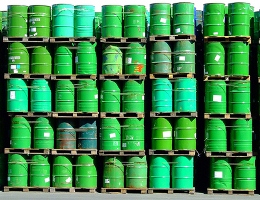 NEW DELHI, Feb 18 (Reuters) - India is now paying�Iran�only in rupees for its oil after it lost another payment route in euros due to tougher sanctions from Feb. 6, sources at local refiners said, leaving Tehran struggling to use the tightly-restricted Indian currency.
NEW DELHI, Feb 18 (Reuters) - India is now paying�Iran�only in rupees for its oil after it lost another payment route in euros due to tougher sanctions from Feb. 6, sources at local refiners said, leaving Tehran struggling to use the tightly-restricted Indian currency.The rupee is only partly convertible, limiting its international acceptability, although Iran can use the currency to buy non-sanctioned goods and services from India.
Turkey's Halkbank had been handling payments for Iranian oil in euros from India since July 2011 after other conduits were choked by earlier sanctions, but the latest U.S. measures effectively prevent this, bankers said.
India is Iran's second-biggest client after�China�but, the world's fourth-largest oil importer India has been reducing imports and so secured a waiver from earlier sanctions that would have impeded its access to global banking networks.
The European Union and United States are using sanctions to force Iran to curb its disputed nuclear programme, which the West believes is aimed at making a bomb but Iran says is for civilian use.
Sources at two Indian refiners said they received an email from Halkbank on Feb. 5 that it will not be able to handle Iranian oil payments from Feb. 6.
"We will not be able to execute your general instructions issued in July 2011 from the date of Feb. 6, 2013," said one of the sources, reading out the letter sent by Halkbank.
The second source confirmed receiving a one-sentence email from Halkbank. "Halkbank is history now," he said.
The tighter U.S. sanctions are also killing off Turkey's own gold-for-gas trade with Iran.
India had been paying through Halkbank for about 45 percent of its massive Iranian oil bill since April 2012 with the rest in rupees. The two nations had been trying to find goods for Iran to buy from India, to smooth a huge trade imbalance.
India's total exports to Iran in April-September 2012 amounted to $1.4 billion, a quarter of the value of its imports from Iran during the period, according to Indian government data.
There have been several visits by trade delegations to try to boost exports from India, especially of foodstuffs which are not prohibited under sanctions, but few deals have got off the ground. Iran has bought sugar from India but attempts to sell wheat to Tehran have faced quality issues.
The two sides have yet to find another way to settle their oil trade and Indian refiners are currently retaining 55 percent of their payments to Tehran.
"In this kind of scenario, do you think it is easy to find out a new payment mechanism?" asked the first source.
HPCL-Mittal Energy Ltd (HMEL), part-owned by steel tycoon Lakshmi Mittal may now be able to clear its dues in rupees, built up after India said it could only pay 45 percent in rupees and Halkbank refused to open a euro account for the private refiner.
HMEL bought a total 4 million barrels of oil from Iran between September and October 2012.
India plans to reduce imports from Iran by another 10-15 percent in the next contract year starting April 1, sources have said.
In the first nine months of the contract year 2012/13, India imported 270,700 barrels per day from Iran, about 7.5 percent of total purchases by the country, which depends on imports for 80 percent of its oil needs.
By Reuters
The Iran Project is not responsible for the content of quoted articles.










